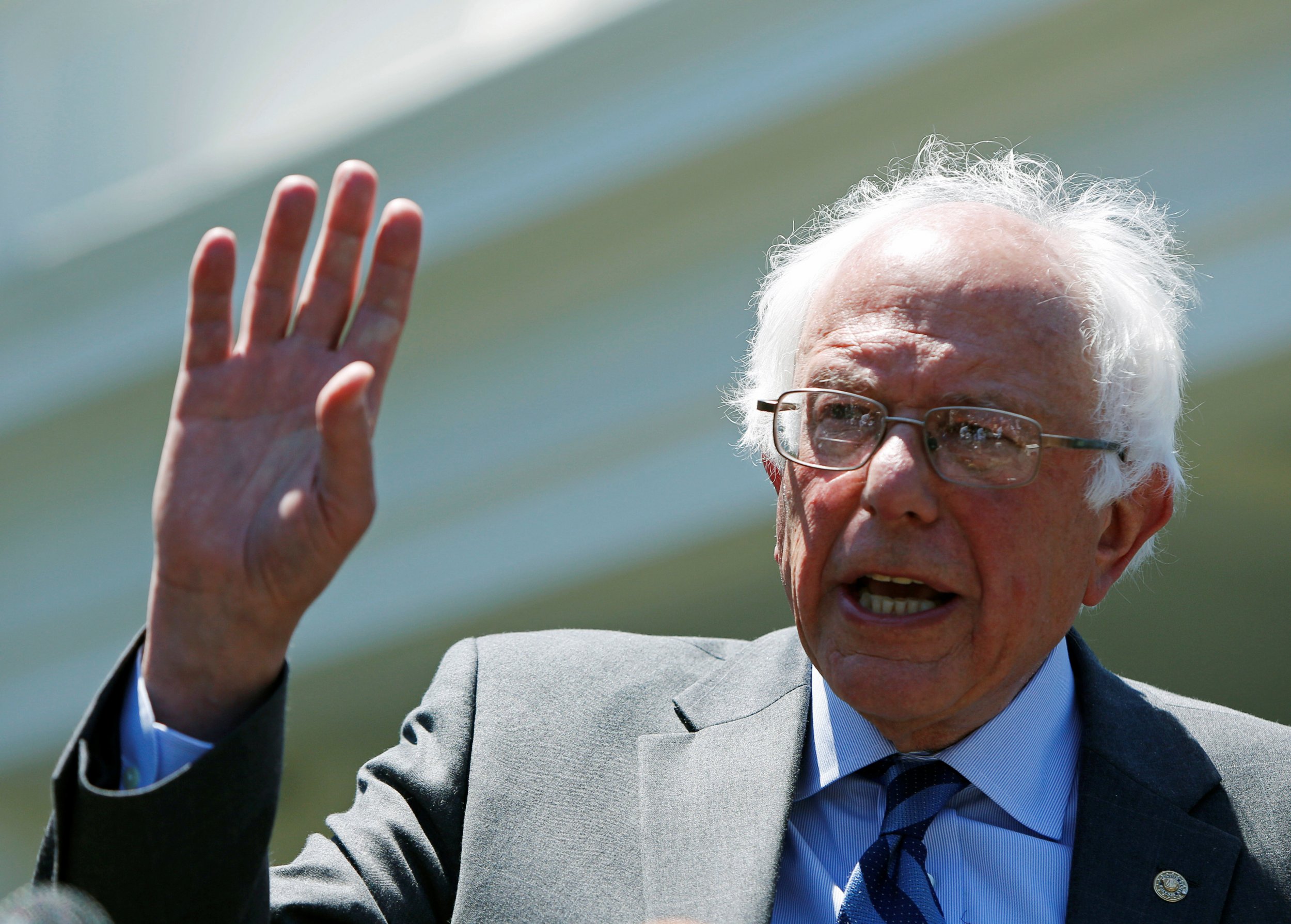
Updated | Bernie Sanders again refused to concede the Democratic race to opponent Hillary Clinton and simultaneously vowed on Thursday "to do everything" he can to ensure Donald Trump doesn't become president, which he said would be "a disaster."
After meeting with President Barack Obama for more than an hour Thursday, the Vermont senator pledged to remain in the race through next week's final primary in Washington, D.C., and to bring his campaign's issues to the Democratic National Convention in Philadelphia at the end of July. He lauded his "movement," which he says aims "to create a government which represents all of us and not just a handful of wealthy campaign contributors."
Shortly after their meeting, Obama formally endorsed Clinton for president in a video in which he said there has never been "someone so qualified to hold this office." He is expected to appear with her on the campaign trail soon.
For months, some Democrats have accused Sanders of damaging the Democratic campaign by continuing after it was clear Clinton would likely secure the nomination—a historic feat she claimed Tuesday, after major wins in California and New Jersey. Many think Sanders's bowing out of the race is crucial to defeating Trump in the November election.
"I will work as hard as I can to make sure that Donald Trump does not become president of the United States," Sanders said during his brief address to the press at the White House. "I will of course be competing in the D.C. primary." He said his major point there will be to make residents aware that he is strongly in favor of D.C. statehood.
Obama is pushing for Democratic unity largely because his party needs the senator's large base of supporters. But the president is treading carefully, encouraging Sanders to fight the GOP's expected nominee while also allowing him to make his own decision about when to end his rousing progressive campaign.
The meeting in the Oval Office was the second conversation between Obama and Sanders this week: The two spoke over the phone just four days ago, ahead of the six primaries that took place Tuesday. This latest meeting comes just two days after Clinton celebrated becoming the first woman in U.S. history to capture the nomination from a major political party.
Sanders also referenced a conversation he had with Clinton Tuesday night, during which he said he congratulated the former secretary of state on her "very strong campaign."
"I look forward to meeting with her in the near future to see how we can work together to defeat Donald Trump and to create a government which represents all of us and not just the 1 percent," he said.
Still, Sanders refused to acknowledge Clinton's victory because, he says, the nomination can't be secured until superdelegates—those who can support any contender for the nomination—cast their votes at the Democratic Convention. After picking up wins in Montana and North Dakota, Sanders vowed in a speech Tuesday to continue with his campaign until the convention. By Thursday, even some Sanders allies had called for the contest between Clinton and Sanders to end.
"Once a candidate has won a majority of the pledged delegates and a majority of the popular vote, which Secretary Clinton has now done, we have our nominee," Jeff Merkley, Sanders's sole supporter in the Senate, told The Washington Post. "This is the moment when we need to start bringing parts of the party together so they can go into the convention with locked arms and go out of the convention unified into the general election."
Obama seems to be ready to hit the campaign trail with Clinton, as indicated by the recent increase in his attacks against Trump. During a commencement speech at Rutgers University last month, he took an apparent swipe at the GOP candidate when he told the graduates that "ignorance is not a virtue" in life and politics.
"The main role I'm going to be playing in this process is to remind the American people that this is a serious job, this is not reality TV," Obama told Jimmy Fallon during a taping of The Tonight Show that will air Thursday night.
Also on Thursday, Sanders was expected to meet with Democratic Senate Minority Leader Harry Reid, another key player in bridging the gap between the two rival campaigns.
Meanwhile, Massachusetts Senator Elizabeth Warren, who has held out on backing any candidate, is expected to play a role in unifying the Democratic Party. She has a heralded reputation on the left for her fiery criticism of Wall Street, and her very liberal persona could energize independents who aren't thrilled about voting for Clinton. Sources close to Warren told Reuters that the senator is close to endorsing Clinton and that while she isn't interested in being chosen for vice president, she hasn't ruled it out.
This story has been updated to include Sanders's comments after his meeting with Obama.
Uncommon Knowledge
Newsweek is committed to challenging conventional wisdom and finding connections in the search for common ground.
Newsweek is committed to challenging conventional wisdom and finding connections in the search for common ground.
About the writer
Michele Gorman is a Newsweek political reporter, with a focus on gun policy. She previously worked at msnbc.com, where she ... Read more
To read how Newsweek uses AI as a newsroom tool, Click here.






